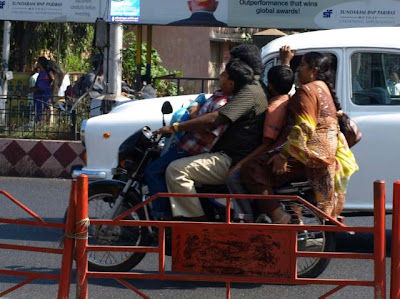We arrived at Murali's parents' home in Chennai, India at 3:00 AM India time, 32 1/2 hours door to door from Eden Prairie, Minnesota. Temperature when we left Minnesota was around 0 degrees F, and about 80 degrees when we arrived in Chennai.
Murali's folks have a spacious, solid, and beautifully built home, with 3 stories and easy access to the flat roof. The view from the roof is quite nice, with a glimpse of the Bay of Bengal. I think I'd sleep up there if I lived here. The roof is a great place to dry the laundry, and there is a water tank which supplies pressurized water to the house. It never freezes here, so there is no concern for insulating water pipes. The family owns 3 coconut trees.
Murali's parents are so hospitable, and we feel so welcomed and cared for.
Everything is brick and mortar, except for the doors, some cabinetry, and door trim. Normal house voltage is 240, with propane tanks and two burners in the kitchen. Our bedroom is very spacious with a private bath, marble floors, ceiling fans, and air. The floor is a visual delight, and the stained glass windows give it a religious feel. In the bedroom notice the marble floors, the window bars, the tube lighting, and yes, air-conditioning! Although it is winter in Chennai, we still used the air to sleep comfortably the first night. --Mike
We had a superb service on the Luftansa flights from Chicago to Frankfurt and Frankfurt to Chennai. As we were flying over Saudi Arabia/the Persian Gulf, we saw the sunset from above the clouds. That was a tremendous sight.
When we got to India, it was 1 a.m., and we had to stand in line for a long time for Immigration. I felt sorry for the parents who were traveling home with one or two small children. Once we got to the top of the line, we got through quickly, and we saw Murali and his dad waiting for us right away.
I had my first experience with a "squat" toilet at the airport--good thing Murali and Ishani explained the concept before I got there. Basically, you squat down, do your business, and then there is a faucet and a pail that you can use to get water for wiping. You use your left hand for this purpose, so when eating and if you are handing something to another person you are always to use your right hand.
We drove home from the airport in a taxi. Since it was late at night, the streets were very quiet. However, we still saw that in India things like lanes and stop lights don't really mean anything. --Bernie
